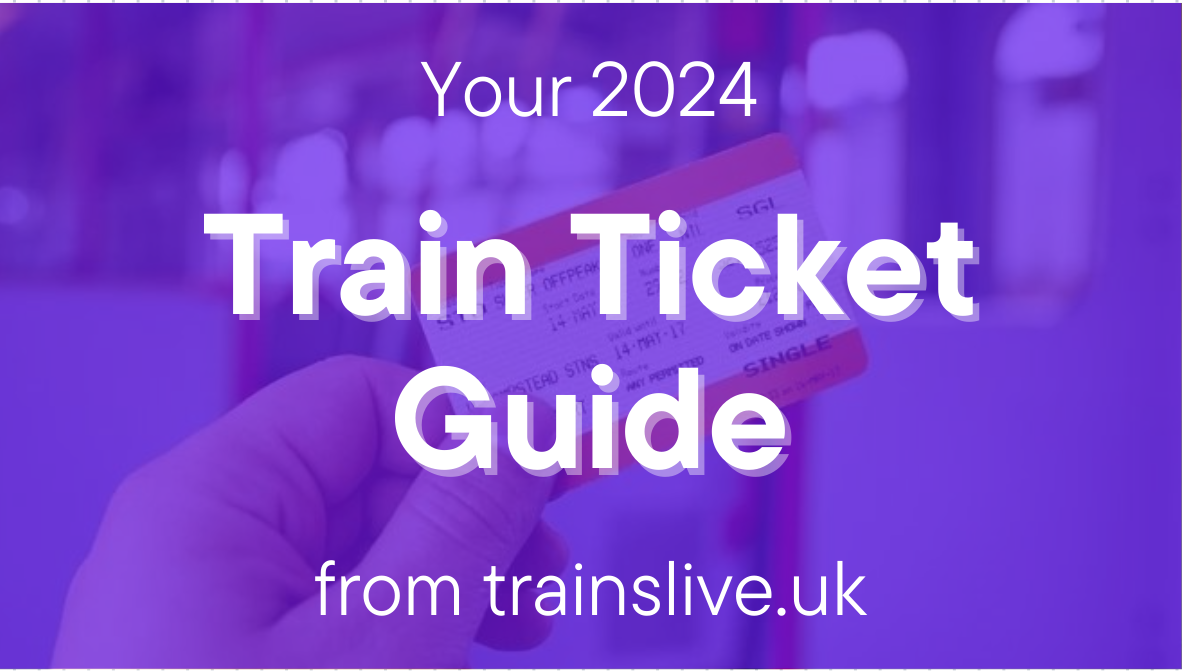The Ultimate Train Ticket Guide for 2024
21 May 2024 by James
It's 2024 yet us passengers are still faced with expensive and complex ticketing. While we can't make your train tickets any cheaper, hopefully this guide will help you understand the different types of fares available to you.

Advance Singles
Advance tickets are usually the cheapest way to travel by train, especially for long journeys. They come in only one form: the Advance Single. However, you can buy two Advance Singles together to make a return journey.
They are sold in limited numbers, and you can usually buy an Advance ticket up to 12 weeks ahead of your journey, and they are still available until the day of travel in most cases - sometimes up to 10 minutes before departure.
Children (5-15) get 50% off all Advance fares, which applies to both Standard and First Class accomodation. Most railcards offer a third off Advance tickets too, but usually for Standard Class only.
Advance tickets are valid for the specified services only, i.e. you must catch the train you chose when buying your ticket. For instance, if your ticket is for the 12:00 service, you can't catch the 12:15 one.
However, you can amend your ticket up to the moment your journey is due to begin, but you might be charged to do this. Advance tickets are non-refundable, so if you choose not to travel, you won't be refunded (exceptions apply during disruption.)
Off-Peak & Super Off-Peak
Off-Peak and Super Off-Peak tickets are valid at less busy times during weekdays (e.g. outside of the morning and afternoon rush hours) and all day on weekends. They are cheaper than other ticket types but have more restrictions.
If there are multiple off-peak fares for your journey, a Super Off-Peak fare may be available, which will be the cheapest of the bunch but will have more restrictions. All Off-Peak and Super Off-Peak tickets may require you to travel during certain hours, or via a certain route.
Generally, off-peak begins at 09:30 in busy towns and cities, and 09:00 everywhere else. These tickets don't require you to travel on specific trains but they will have time restrictions as outlined above.
You can make seat reservations on these tickets where available, but it's not required. Also, railcards will usually give you 1/3 off Standard Class tickets. Children aged 5-15 receive 50% off both First and Standard Class tickets.
Advertisement
Anytime
Anytime tickets are fully flexible and have very few restrictions - however they can be the most expensive of the range, especially for one-off journeys. They can be purchased at any point before you travel and don't have any time restrictions.
Anytime Singles give you the ability to travel within two days of the date shown on the ticket. You can break your journey across stations, meaning you don't have to stay on the same train or complete the whole journey in the same day.
Anytime Return tickets allow you to complete the return ('inward') journey within one calendar month of the outward journey. This means you don't have to return the same day as you travelled to your destination.
Note the above does not apply to Anytime Day tickets, which requires you to travel on the day of the ticket. For returns, this means you must return on the same day as your outward journey.
Similar to the other ticket types above, children get 50% off Advance fares and most railcards offer 1/3 off Standard Class fares (but not First Class - sorry to disappoint!). You can also amend or change your Advance ticket, usually without charge.
Season & Flexi Season
Season tickets offer unlimited travel between two stations. If you make the same journey regularly, a Season ticket or Flexi Season ticket might be better value for money than daily tickets.
Season tickets are available to buy weekly, monthly and annually – as well as any period from a month up to a year. You can travel as much as you like within your chosen time. They are available for both Standard Class and First Class travel.
A Flexi Season ticket gives you 8 days of travel in 28 days, useful if want better value than multiple single tickets but don't want to splash out on a regular Season ticket.
These ticket types are quite complicated and can vary by operator, so it's best to check your operator's official website for the most accurate information.
Advertisement
Ranges & Rovers
Most train companies offer a selection of Rangers and Rovers (not Range Rovers I'm afraid). These are great value tickets that offer unlimited travel within a specified area and time period.
Rangers are valid for one day only, whereas Rovers can be used across multiple days. Again, these are complex tickets and you should check with your operator as there are several types available, each with different restrictions.
Oyster & Contactless
If you're travelling within London, you might find it's best to use an Oyster or Contactless payment card.
There are different fare caps depending on the journeys you take. You can calculate how much it will cost to travel between two Tube stations here. To find the fare caps, you can use our handy tool here.
Well, that concludes this guide. Hopefully you have somewhat of a better understanding, but if you don't, there's no need to stress: simply visit your train company's website or get in touch with them - they will be happy to assist.
Comments
Please sign in or create an account to comment.
Latest articles
-
1⚠️ Global IT outage - Check before you travel ⚠️
-
2Introducing the Knowledge Hub
-
3Avanti's brand new Class 805s are here: any good or another hopeless Hitachi?
-
4Exclusive behind the scenes with an inspirational LNER train driver
-
5End of the road for London's Boris Buses as mayor reveals zero-emission plan
Advertisement
Advertisement